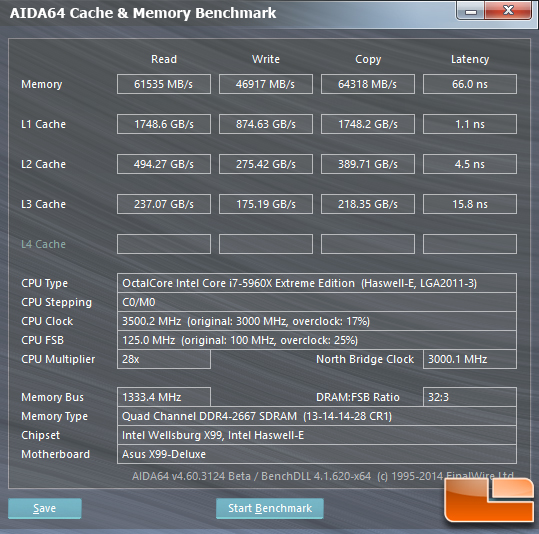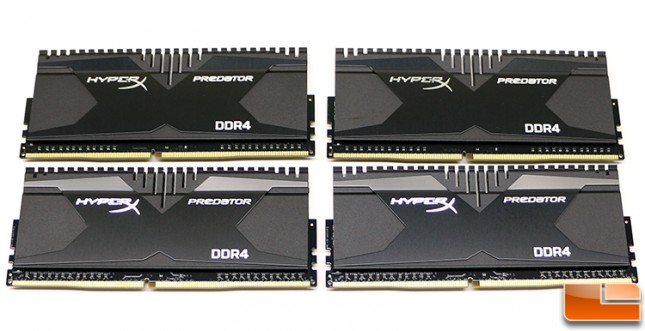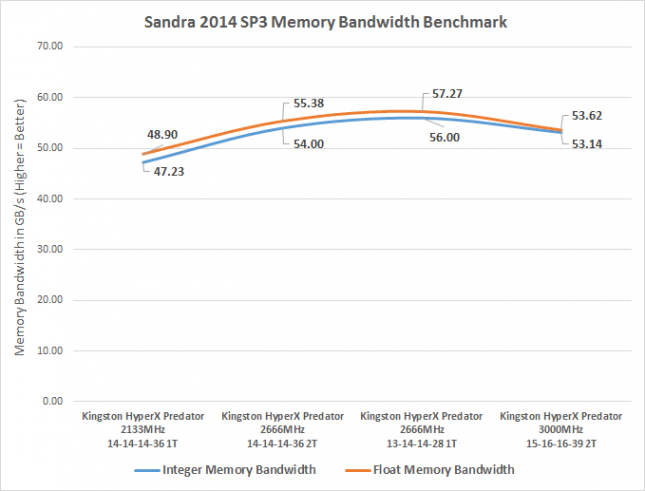Kingston HyperX Predator DDR4 16GB 3000MHz Memory Kit Review
Overclocking Results & Final Thoughts
Overclocking:
No memory review would be complete without overclocking, but we weren’t able to get this particular kit to succesfully boot into Windows 8.1 at 3200MHz or beyond. The kit was already running at 1.50V and we loosened the timings to 16-16-16 with a 2T command rate and we couldn’t even get to the post screen at 3200MHz. Other brands are able to run at 3200MHz (PC4-25600) with 16-16-16-36 timings at 1.35V on the ASUS X99 Deluxe motheboard that we are testing on, so it doesn’t look like this memory kit will be a great overclocker. We can only assume it is due to the particular SKhynixDDR4 memory IC’s that this kit is running.

Since we couldn’t get the clock frequency any higher we tried to get the memory timings tighter at 2666MHz and was able to go from 2666MHz at 14-14-14-36 with a 2T command rate to 13-14-14-28 with a 1T command rate. This had a pretty significant improvement to our memory bandwidth and latency, so we were happy that we were able to run CL13 timings at 2666MHz on this memory kit. We did give 13-13-13-28 1T a try and the system failed to post.

Final Thoughts and Conclusions:
This is our first individual look at a DDR4 memory kit and it’s dj vu all over again. Over the years we have seen that running higher than the JEDEC standard memory clock frequencies most certainly has performance benefits, but at a certain clock speed the performance curve starts to taper off although pricing continues to go sky high as memory companies charge a big premium for clock speeds. When we started out this review we were hopeful that we’d see good scaling from 2133MHz to 2666Mhz and then finally 3000MHz, but we have to admit that we are a bit disappointed with the results.

The Sandra Memory Bandwidth test is arguably the standard benchmark to look at when looking at any memory kit. We found a nice 13.8% increase in the aggregate memory performance when going from 2133MHz to 2666MHz, but then we actually showed a 2.3% performance decrease when going from 2666MHz to 3000MHz. This wasn’t totally unexpected, but we didn’t want to see that until 3200MHz or beyond. We have more testing to do, but it looks like 2666MHz is likely going to be the sweet spot when it comes to DDR4 memory. We were able to tighten up the Kingston HyperX Predator kit at 2666Mhz and was able to get 56.66GB/s for the aggregate memory performance. We were very excited with this score and with our manual tweaks we were able to get an 18% bandwidth improvement!
The Kingston HyperX Predator DDR4 16GB 3000MHz memory kit looks pretty good, but the sweet spot appears to be at the 2666MHz XMP profile due to the tighter timings. If you manually tighten the timings you’ll get even more performance from this kit. Our only big reservation about this kit for the time being is that it needs to run at 1.5V, which is what most DDR3 memory runs at. One of the big selling points of DDR4 memory that they are low voltage parts, but that isn’t the case on this particular kit and it is the only 1.5V kit that we have run across by any company. G.Skill for example is hitting 3200MHz with just 1.35V, so this kit is certainly on the higher side of things when it comes to power.
We aren’t sure what the pricing will be on the Kingston HyperX Predator 16GB (4x4GB) 3000MHz DDR4 memory kit with part number HX430C15PBK4/16, but we do know it will be out this month and will be backed by a lifetime warranty. It’s hard to recommend a DDR4 memory kit when you haven’t looked at many of them and don’t have any clue on what the pricing will be, so we’ll end this review without a solid answer.
UPDATE 9/5/2014 (6pm CT) – After talking with our sources inside Kingston we are expecting this kit to run $300 to $350 when it is launched later this month. Most 16GB DDR4 kits that are 3000MHz are right around $389.99, so it Kingston can come in below that it would be great for the DIY PC community and may even help drive DDR4 prices down. Right now DDR4 memory carries about a about a 52% price premium over DDR3 Memory. For example a 16GB DDR4 kit of 2133MHz memory runs $249.99 and a 16GB DDR3 kit of 2133MHz runs $159.99. We expect that 52% price gap to close in the years ahead, but it will likely be several years before we see price parity.
